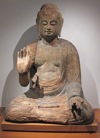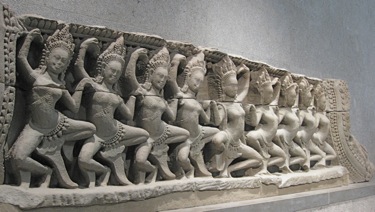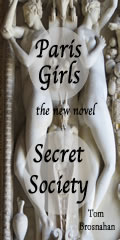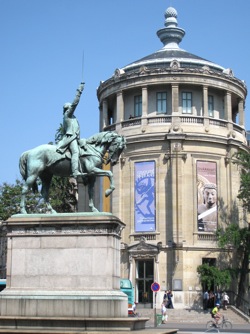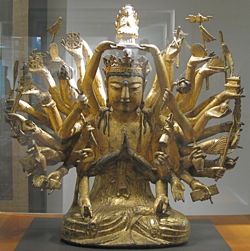 |
Musée Guimet, Asian Arts, Paris | |
|
With one of the largest collections of Asian Arts in the West, the Musée Guimet explores a variety of cultures and traditions from across Asia.
|
||
|
|
|
The Musée Guimet (Musée National des Arts Asiatiques) describes itself as "illustrating the diverse cultures and civilizations in Asia, covering an area as vast in time (five millenia) as in space (from India to Japan)." From the moment you enter and are greeted by a vast hall of statues (many from Cambodia), you never forget that this is a museum of Asian Art. You can compare and contrast the art of Afghanistan/Pakistan with that of Southeast Asia, or China, for example.
Statues of Buddha, Amida, and Shiva share space with calligraphy, sumi paintings, and decorative arts. The collections are beautiful and and the quality and variety of holdings are impressive. The lovely circular Library, under the dome with its watchful carytids, is visible from the second floor. The original books are part of a collection of over 100,000 pieces. In addition, in 1905 Matahari danced in the Library! Although the descriptive signs are in French, many rooms have explanations in English and other languages on large laminated cards. The Musée Guimet was opened in 1889 by Émile Guimet, an industrialist from Lyon who traveled the world and collected works of art. After a major renovation in the late 1990s, the museum re-opened to the public in 2001. The displays are harmonious and well-lit and the visit manages to be both stimulating and peaceful at the same time.
The nearby Buddhist Pantheon (included in admission) houses the Guimet Museum's original collection. The Musée Guimet has a small restaurant that serves light lunch, including some Asian-themed items. The Musée Guimet is in a distinctive round building, in the Place d'Iéna. Look for the statue of George Washington in the center of the Place. If you want to see even more art of Asia, you might also want to visit the Musée Cernuschi, one of the fourteen museums of the City of Paris. It has a large collection of Chinese art, bequeathed by financier Henri Cernuschi. Métro: Iéna Paris Museum Pass accepted. Closed Tuesday. Musée Guimet
|
|
Above: Musée Guimet, Paris.
|
